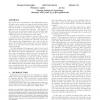Free Online Productivity Tools
i2Speak
i2Symbol
i2OCR
iTex2Img
iWeb2Print
iWeb2Shot
i2Type
iPdf2Split
iPdf2Merge
i2Bopomofo
i2Arabic
i2Style
i2Image
i2PDF
iLatex2Rtf
Sci2ools
PVLDB
2010
2010
Regret-Minimizing Representative Databases
We propose the k-representative regret minimization query (k-regret) as an operation to support multi-criteria decision making. Like top-k, the k-regret query assumes that users have some utility or scoring functions; however, it never asks the users to provide such functions. Like skyline, it filters out a set of interesting points from a potentially large database based on the users’ criteria; however, it never overwhelms the users by outputting too many tuples. In particular, for any number k and any class of utility functions, the k-regret query outputs k tuples from the database and tries to minimize the maximum regret ratio. This captures how disappointed a user could be had she seen k representative tuples instead of the whole database. We focus on the class of linear utility functions, which is widely applicable. The first challenge of this approach is that it is not clear if the maximum regret ratio would be small, or even bounded. We answer this question affirmatively. T...
Related Content
| Added | 30 Jan 2011 |
| Updated | 30 Jan 2011 |
| Type | Journal |
| Year | 2010 |
| Where | PVLDB |
| Authors | Danupon Nanongkai, Atish Das Sarma, Ashwin Lall, Richard J. Lipton, Jun Xu |
Comments (0)

